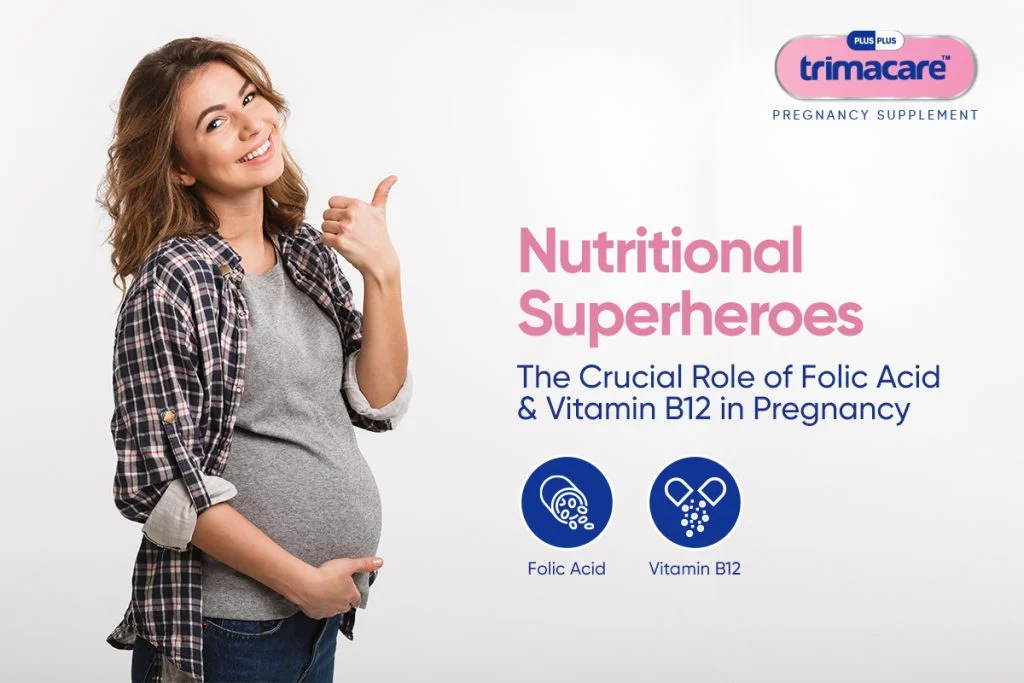Pregnancy is a crucial stage when the nutritional needs of both the mother and the developing baby increase significantly. Among the essential nutrients, folic acid, and vitamin B12 play a vital role in supporting a healthy pregnancy and ensuring the proper development of the foetus. Vitamin B12 during pregnancy is essential as it helps with cell division. Vitamin B12 in pregnancy helps in DNA synthesis and combined with folic acid, stimulates the development of your baby’s brain and spinal cord.
Let’s explore the importance of these nutrients during pregnancy and their benefits for both the mother and the baby.
Importance of Folic Acid for Healthy Pregnancy
Folic acid, often known as folate, is vital for the development of new cells and the production of DNA. Importance of Folic acid during pregnancy for the following reasons:
- Neural Tube Development: Adequate folic acid intake before and during early pregnancy can significantly reduce the risk of neural tube defects (NTDs) in the baby, such as spina bifida and anencephaly. Neural tube defects affect the development of the brain and spinal cord.
- Red Blood Cell Production: Folic acid is helpful in the production of red blood cells, necessary for delivering oxygen to the baby and preventing anaemia in the mother.
- DNA and Genetic Material: Folic acid is necessary for the synthesis of DNA and genetic material in cells, promoting healthy cell division and growth in the developing foetus.
Vitamin B12 in Pregnancy
During pregnancy, prioritizing a nutritious diet is crucial for the mother’s and baby’s health. Despite common discomforts such as morning sickness, nausea, and fatigue, it’s essential to focus on meeting your nutritional needs to prevent deficiencies that can impact mother and child. Vitamin B12 during pregnancy is one of the key nutrients that plays a vital role. Let’s delve into the importance of Vitamin B12 in pregnancy.
Importance of Vitamin B12 During Pregnancy
Vitamin B12 in pregnancy for cell division and DNA synthesis. For several reasons Vitamin B12 during pregnancy is crucial —
- Supports Foetal Development: Vitamin B12 in pregnancy is important for the healthy development of the baby’s nervous system and brain. Sufficient intake of B12 in pregnancy helps avert neural tube defects and promotes the healthy development of the spinal cord and brain.
- Prevents Anaemia: Pregnant women are more susceptible to developing anaemia, leading to fatigue and weakness. Vitamin B12 works together with folic acid to stimulate the production of red blood cells, thereby reducing the risk of anaemia and ensuring adequate oxygen supply for the mother and baby.
- Boosts Energy Levels: Pregnancy can be exhausting, as increased energy demands often leave expectant mothers feeling fatigued. Vitamin B12 in pregnancy plays a crucial role in converting food into energy, helping to combat fatigue and support overall well-being.
- Supports Maternal Mental Health: Hormonal changes during pregnancy can have a profound impact on mental health. B12 in pregnancy helps in the production of neurotransmitters which is essential for mood regulation and lowering the risk of prenatal depression.
- Ensures Healthy Birth Weight: Maintaining adequate Vitamin B12 levels is associated with healthy birth weight. B12 deficiency in pregnancy can result in low birth weight, potentially posing various health risks for the newborn.
Vitamin B12 deficiency in pregnancy
B12 deficiency in pregnancy can lead to several serious health complications for the mother and the developing baby. For the mother, B12 deficiency in pregnancy can cause symptoms such as fatigue, weakness, anaemia, and neurological issues, including memory problems and difficulty concentrating. For the developing baby, insufficient B12 can result in neural tube defects, impaired brain development, and an increased risk of low birth weight and preterm birth. Additionally, Vitamin B12 deficiency in pregnancy can interfere with the production of red blood cells, leading to megaloblastic anaemia, which can further impact oxygen delivery to the foetus. Ensuring adequate intake of B12 through diet or supplements is crucial for a healthy pregnancy and optimal foetal development.
How can you enhance your vitamin B12 level during pregnancy?
You can boost your vitamin B12 levels for pregnancy through various ways-
- Balanced diet: Incorporate foods rich in vitamin B12 into your daily meals. Excellent food sources of vitamin B12 include meats like beef, poultry, and seafood, as well as eggs and dairy products such as milk, cheese, and yoghurt. If you follow a vegetarian or vegan diet, opt for fortified plant-based milk or breakfast cereals, and consider nutritional yeast, a natural source of B12 in pregnancy.
- Fortified foods: Consider fortified foods enriched with vitamin B12, such as fortified cereals, nutritional yeast, plant-based milk, and certain meat substitutes.
- Prenatal tablets: Prenatal vitamins are specially designed to fulfil the nutritional requirements of pregnant women, including providing adequate vitamin B12 for pregnancy. For those struggling to obtain sufficient Vitamin B12 for pregnancy through diet alone, pregnancy supplements offer a reliable alternative.
What is the normal range of vitamin B12 for pregnancy?
The normal range of vitamin B12 for pregnancy typically falls between 200 and 900 mL. However, levels above 300 mL are generally considered adequate, while levels below 200 mL may indicate a vitamin b12 deficiency. Pregnant women need to maintain adequate B12 levels to support both their health and the proper development of their babies. Regular prenatal check-ups and blood tests can help monitor and manage the levels of B12 for pregnancy.
Why do vegetarian women need vitamin B12 supplements during pregnancy?
Vegetarian women need a Vitamin B12 supplement during pregnancy because this crucial nutrient is primarily found in animal products such as meat, fish, eggs, and dairy. Since vegetarian diets exclude these sources, obtaining adequate Vitamin B12 for pregnancy through food alone can be challenging. Vitamin B12 for pregnancy is essential for the baby’s brain and nervous system development and helps prevent anaemia in the mother by supporting red blood cell production. Vitamin B12 deficiency in pregnancy can lead to severe complications, including developmental delays and neural tube defects in the baby, as well as heightened fatigue and weakness in the mother. Therefore, Vitamin B12 supplementation is necessary to ensure that the mother and baby receive the required amount of this vital nutrient for a healthy pregnancy.
Food Sources of folic acid and Vitamin B12 in Pregnancy
Folic acid can be obtained from various food sources such as leafy green vegetables, citrus fruits, beans, fortified cereals, and bread. Good sources of vitamin B12 in pregnancy include meat, fish, dairy products, and eggs. However, it’s important to understand that since vitamin B12 is largely found in foods derived from animals, vegetarians and vegans can take Vitamin B12 through fortified meals or supplements.
Trimacare is the best Vitamin B12 pregnancy supplement
Trimacare pregnancy vitamin tablet contain over 20 essential nutrients in a trimester-specific formulation, ensuring that the mother and baby receive the right nutrients at each stage of pregnancy. By delivering all these nutrients in a single pill, Trimacare simplifies the process of taking multivitamins tablet in pregnancy.
Trimacare Prenatal pills are crafted by renowned doctors, pharmacologists, and nutritionists in a GMP-certified facility using advanced, GMO-free ingredients. This ensures they are of superior quality and reliability.
Trimacare pregnancy supplement is an ideal option for pregnant women, especially those who follow a vegetarian diet and find it challenging to obtain sufficient Vitamin B12 from their food. Vitamin B12 in pregnancy is essential for the development of the baby’s nervous system and to prevent maternal anaemia. However, since most natural sources of Vitamin B12 are non-vegetarian, vegetarian pregnant women are at a higher risk of deficiency. Trimacare prenatal vitamin addresses this issue by providing a 100% vegetarian source of Vitamin B12 making it a suitable and safe supplement for expecting mothers. Additionally, the Trimacare pregnancy multivitamin is designed to be gentle on the stomach, avoiding common issues such as burps and the unpleasant fish oil smell associated with some other supplements. This makes the Trimacare prenatal tablet a convenient and effective solution for maintaining optimal level of folic acid and vitamin B12 for pregnancy, ensuring maternal and foetal health.
Conclusion
Folic acid and Vitamin B12 in pregnancy plays a vital role in supporting a healthy and optimal development for the mother and the baby. From helping in the production of red blood cells to supporting neurological development, its benefits are crucial throughout pregnancy. Whether through a balanced diet rich in animal products or fortified foods for vegetarians and vegans, maintaining adequate B12 in pregnancy is essential for a smooth and healthy pregnancy journey. Always consult with a doctor to ensure you are meeting your specific nutritional needs during this transformative time.
Frequently Asked Questions:
1. What is the role of folic acid during pregnancy?
Folic acid assumes a vital part in forestalling brain tube surrenders in the creating baby, for example, spina bifida.
2. How does vitamin B12 contribute to a healthy pregnancy?
During pregnancy, both the development of the baby’s nervous system and the formation of red blood cells require vitamin B12.
3. What foods are rich in folic acid?
Leafy green vegetables, citrus fruits, beans, peas, and fortified cereals are all sources of folic acid.
4. Are there any risks associated with a deficiency in folic acid during pregnancy?
Indeed, a lack in folic acid during pregnancy can expand the gamble of brain tube surrenders in the child, like anencephaly and spina bifida.
5. Can pregnant women take supplements to ensure adequate intake of folic acid and vitamin B12?
Indeed, prenatal nutrients containing folic acid and vitamin B12 are frequently prescribed for pregnant ladies to guarantee they meet their nourishing necessities during pregnancy.
A Certified Nutritionist with a rich healthcare background in health journalism, the author has immense experience in curating reader-friendly, engaging, and informative healthcare blogs to empower readers to make informed pregnancy-related decisions.













